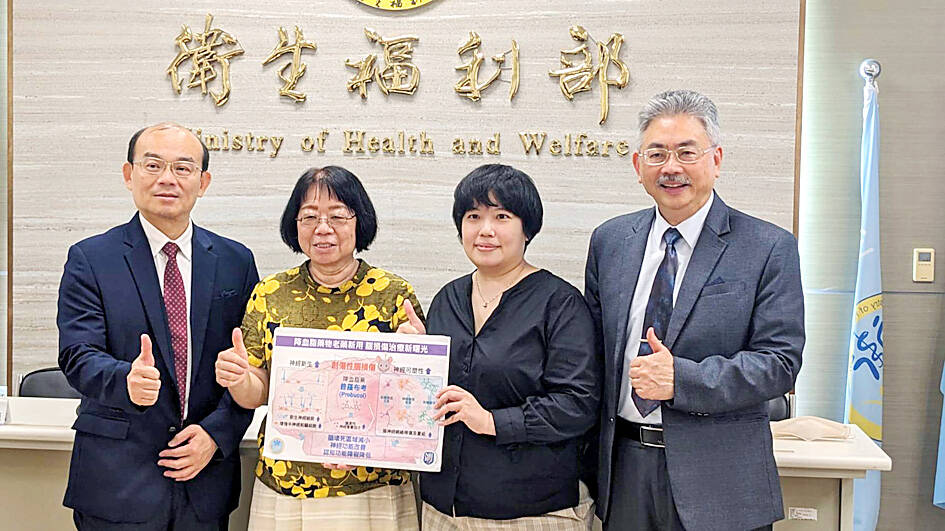The use of probucol, a cholesterol-lowering drug, in mice with traumatic brain injury has been shown to promote neuroregeneration and improve functional deficits, suggesting it could be used to treat humans with brain injuries, a National Health Research Institutes (NHRI) research team said yesterday.
NHRI vice president Chen Wei-jen (陳為堅) said that traumatic brain injuries are usually caused by a severe blow to the head, such as in motor vehicle crashes, falls or being struck by an object.
About 650,000 cases of traumatic brain injury are reported each year in Taiwan, with about 100,000 classified as moderate to severe, Chen said.

Photo: CNA
Survivors of moderate-to-severe traumatic brain injury often have damaged neurological and cognitive functions, as well as other prolonged or permanent disabilities, and are at a higher risk of developing dementia, he said.
However, no drug has been approved to treat that alone.
A research team led by NHRI Institute of Cellular and System Medicine researcher Yet Shaw-fang (林秀芳) found that the daily administration of probucol in mice with traumatic brain injury promoted neuroregeneration, reduced their brain lesion volume, improved motor functions and attenuated memory dysfunctions.
The condition of about 26 percent of people with moderate-to-severe traumatic brain injury who undergo rehabilitation for five years might improve, 22 percent might remain the same, 30 percent might worsen and 22 percent might die, NHRI Institute of Cellular and System Medicine postdoctoral fellow Chen Chien-mei (陳倩玫) said, citing clinical data.
In adults, neurogenesis (the growth of new brain cells) and neuroplasticity (the brain’s capacity to change and adapt) appear to be considerably more limited, so dead or damaged neurons in the brain due to traumatic brain injury usually only have a minimal or partial and slow functional recovery, she said.
As probucol is a compound with anti-oxidant and anti-inflammatory properties, the team administered it to mice with traumatic brain injury in experiments, she said, adding that they surprisingly discovered that probucol activated the brain-derived neurotrophic factor, promoted post-traumatic neurogenesis and neuroplasticity, stimulated neurite outgrowth and reduced brain lesion volume by 33 percent.
Probucol also enhanced recovery from injury-induced body asymmetry, improved post-injury motor function and ameliorated memory dysfunction in the mice, she said, adding that it might also be used to reduce the risk of dementia in people with traumatic brain injury.
The cholesterol-lowering drug has established safety profiles, meaning that it could be repositioned to treat people with traumatic brain injury, Yet said.
As the team has identified the neuroregenerative properties of probucol in mice, as well as its properties in improving post-injury neurological and cognitive disabilities, the findings could be applied to clinical trials to establish the proper dosage and course of treatment for humans, Yet said.
The team’s findings were published in the British Journal of Pharmacology in June.

The Chinese Communist Party (CCP) is pushing for residents of Kinmen and Lienchiang counties to acquire Chinese ID cards in a bid to “blur national identities,” a source said. The efforts are part of China’s promotion of a “Kinmen-Xiamen twin-city living sphere, including a cross-strait integration pilot zone in China’s Fujian Province,” the source said. “The CCP is already treating residents of these outlying islands as Chinese citizens. It has also intensified its ‘united front’ efforts and infiltration of those islands,” the source said. “There is increasing evidence of espionage in Kinmen, particularly of Taiwanese military personnel being recruited by the

ENTERTAINERS IN CHINA: Taiwanese generally back the government being firm on infiltration and ‘united front’ work,’ the Asia-Pacific Elite Interchange Association said Most people support the government probing Taiwanese entertainers for allegedly “amplifying” the Chinese Communist Party’s propaganda, a survey conducted by the Asia-Pacific Elite Interchange Association showed on Friday. Public support stood at 56.4 percent for action by the Mainland Affairs Council and the Ministry of Culture to enhance scrutiny on Taiwanese performers and artists who have developed careers in China while allegedly adhering to the narrative of Beijing’s propaganda that denigrates or harms Taiwanese sovereignty, the poll showed. Thirty-three percent did not support the action, it showed. The poll showed that 51.5 percent of respondents supported the government’s investigation into Taiwanese who have

South Korean K-pop girl group Blackpink are to make Kaohsiung the first stop on their Asia tour when they perform at Kaohsiung National Stadium on Oct. 18 and 19, the event organizer said yesterday. The upcoming performances will also make Blackpink the first girl group ever to perform twice at the stadium. It will be the group’s third visit to Taiwan to stage a concert. The last time Blackpink held a concert in the city was in March 2023. Their first concert in Taiwan was on March 3, 2019, at NTSU Arena (Linkou Arena). The group’s 2022-2023 “Born Pink” tour set a

A Philippine official has denied allegations of mistreatment of crew members during Philippine authorities’ boarding of a Taiwanese fishing vessel on Monday. Philippine Bureau of Fisheries and Aquatic Resources (BFAR) spokesman Nazario Briguera on Friday said that BFAR law enforcement officers “observed the proper boarding protocols” when they boarded the Taiwanese vessel Sheng Yu Feng (昇漁豐號) and towed it to Basco Port in the Philippines. Briguera’s comments came a day after the Taiwanese captain of the Sheng Yu Feng, Chen Tsung-tun (陳宗頓), held a news conference in Pingtung County and accused the Philippine authorities of mistreatment during the boarding of